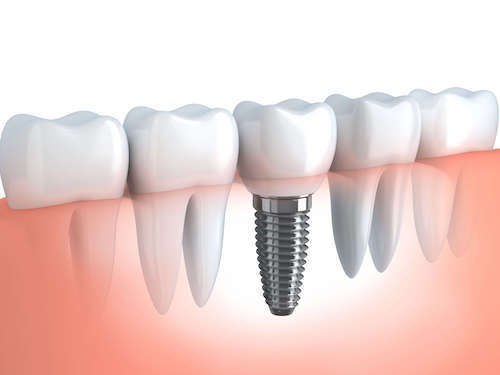What Are Dental Implants, and Should I Consider Them?

What are dental implants?
Dental implants are effective solutions for replacing severely damaged or missing teeth. An implant dentist can replace one or multiple teeth with artificial teeth, using a surgical procedure. The replacement teeth are permanently inserted, giving the appearance and versatility of natural teeth.
During the dental implant surgery, a metal post is inserted into the jaw bone, mimicking the roots of your natural teeth. It may be necessary to wait for the post to complete osseointegration, or the fusion of the implant post with organic bone structure. Afterwards, an artificial tooth (sometimes called a dental crown) is added to the exposed section of the implant post.
Dental implant surgery is usually performed in stages, which vary based on several factors, including:
- The removal of dead or damaged teeth
- Jawbone grafting and healing
- The amount of teeth replaced
- Placement of the metal post
- Addition of the dental crowns
There are two main types of dental implants: endosteal dental implants and subperiosteal dental implants. Which type that the dentist recommends will vary based on your jawbone and whether you have periodontal disease, or bone loss.

Are dental implants permanent?
Yes, dental implants are a permanent solution for tooth loss.
Because the implant post fuses to your natural bone during osseointegration, they won’t be easily removed. Just like a natural tooth, the implant placement is secured, and usually only moves due to trauma or other periodontal or gum disease.
What do dental implants look like?
Ideally, the implants will look like natural teeth.
The dentist or oral surgeon will create a unique mold, made just for you. The customized crown or bridge should be made to look similar to your remaining teeth. The color, size and shape will all be created per your needs and aesthetic preferences.
The dentist will make a plaster mold of your remaining natural teeth and/or the empty tooth cavity, which will help their team to create the best size and shape for your crown. This customization process is important because it will keep your dental implant from looking unnatural or fake.
All in all, your cosmetic dentist will work to make sure that your dental implants look and feel like natural teeth.
How long do dental implants last?
Just like natural teeth, dental implants require proper care and diligent oral hygiene. If maintained properly, the replacement tooth can last as long as real teeth.
Because they are designed to be a permanent solution for lost teeth, the implants are built to withstand normal wear and tear from biting, chewing, smoking and/or chewing tobacco products, and minor traumas.
It’s also important to note that other factors play into how long dental implants last. For instance, existing periodontal, jawbone, or gum disease may shorten the longevity of your replacement teeth. The location of the implant is also important. Implants replacing molars are more likely to see normal wear and tear.
The crown of the implant is more likely to see damage than the implant post itself, so it’s also possible that the post is well-secured while the crown may need to be replaced. Without complications, the implant post may last for decades, while the crown itself can last between 5 and 15 years.
Do dental implants hurt?
Implant surgery is recommended when patients have lost or are going to lose their natural teeth. Because the tooth root has to be recreated, the implant procedure is invasive. You may need to replace one lost tooth, or several, depending on your oral health and needs.
Whether the implant surgery is painful varies by patient. If you have periodontal disease or bone loss, additional procedures such as bone augmentation or grafting may be necessary.
Less invasive alternatives to dental implants include:
-
- Veneers
- Crowns
- Removable dentures (either partial dentures or full dentures)
- Removable or fixed bridges
Are dental implants safe?
While the success rate is over 90%, the risks of early dental implant failure are somewhere between 5% to 10% (source). Prior to committing to the dental procedure, your oral surgeon will assess your oral health.
Implant dentistry overall has a fairly low failure rate, but additional factors – such as periodontal disease, bone loss, inflammation of the soft tissue at the implant site, autoimmune disease, or a lack of osseointegration to the jawbone – can have adverse effects on the tooth replacement, including implant failure.
For implant success, it’s important that you trust your dentist’s assessment of your risks, and adhere to their advice.
How much are dental implants?
The price of dental implants varies by oral surgeon, location, and type of implants. The price can also be affected by preexisting conditions that could affect the treatment plan, like bone loss, gum disease, and existing medication plans.
Although dental implants are ideal for teeth replacement, more cost-effective (although less permanent) solutions do exist. When you schedule your consultation with your restorative or cosmetic dentist, he or she will give you an overview of your options and the price table.
Who should consider dental implants?
There are many reasons to look into dental implant surgery. If a patient has tooth loss or severely damaged teeth, he or she may look to a cosmetic dentist to restore their smile, or help with mastication while eating. Other patients may require implants to maintain their jawbone shape, because the artificial tooth roots help maintain bone structure. Others still may have a speech impediment or an articulation disorder due to the shape or placement of their teeth.
For more information, you can also read our blog post, Why Dental Implants?
If you are considering dental implants, please feel free to schedule a consultation with our clinic here at Bear Brook Dental Care in Montvale, New Jersey. Our own Dr. Kiwon Lee specializes in dental implants, and has performed hundreds of successful cosmetic and restorative dental treatments. Bear Brook Dental Care also offers a free second opinion consultation, including dental implants. Call our office for more details!
To schedule a consultation or appointment, use our online form to reserve your appointment.